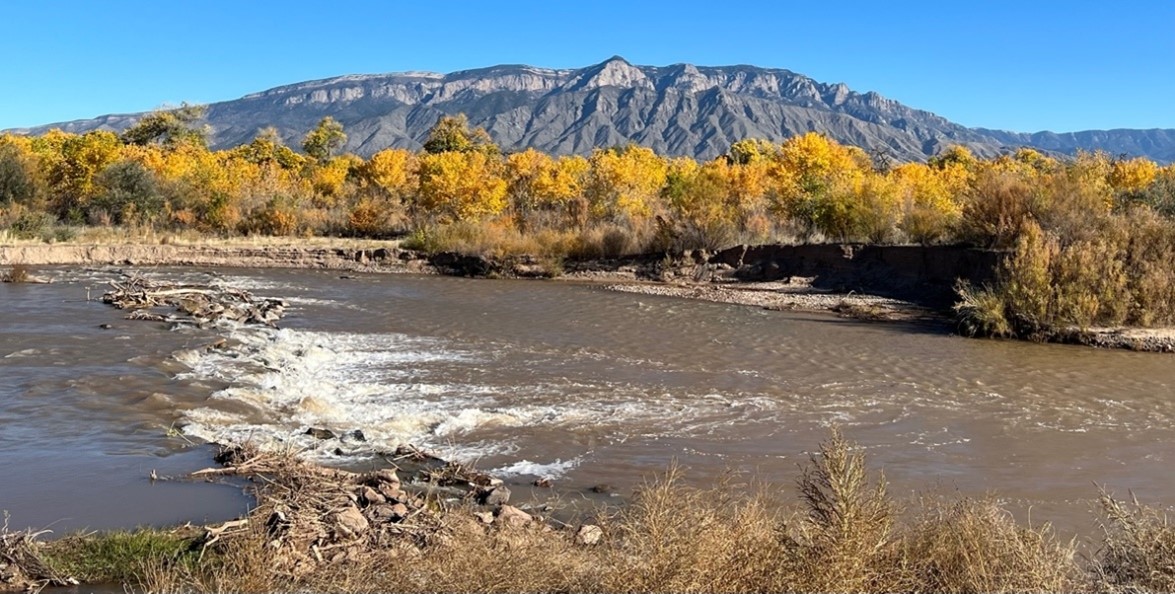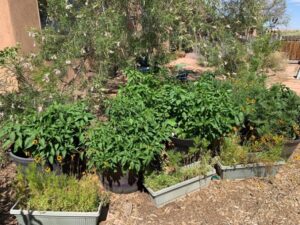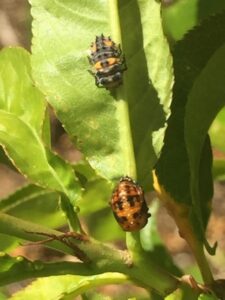Adapting your Garden to a Changing Climate

Adapting your Garden to a Changing Climate
-Sam Thompson – Sandoval Extension Master Gardener
The Southwestern United States is the hottest and driest area in the country. Climate change is making the area hotter and drier.
Managing a precious resource: Water 💧
Water is a finite resource that each New Mexican is dependent upon, so each of us should use it wisely. Native plants are most adapted to our hot and dry conditions and provide beauty while being water wise and attractive to pollinators. Selecting plants that are adapted to hot and dry conditions are the best choice for your garden.
Carefully select your watering technique to minimize evaporation. 505outside.com offers valuable information on selecting irrigation for your garden as well as advice on the amount of water for various plants by season. Water early in the day to avoid watering in the heat of the day. Use mulch to help retain moisture. Check your watering system weekly and keep it in good repair to avoid waste.
Take advantage of the rain we receive. Design landscapes to channel rainwater to specific planted areas where more moisture is needed. Plant to control erosion and water runoff. Cisterns and rain barrels can be positioned to capture rainwater from roof areas to be stored and used as needed.
Put carbon to good use
Carbon is a normal part of healthy soil. Keeping the carbon in the soil helps plants and the environment. Minimize tillage of the soil. When you remove plants from the soil, cut them off at ground level and allow the roots to decompose and add to the soil’s organic material. Keep your soil covered year-round, either with plants or cover crops or other types of mulch. Covered soil helps retain moisture and prevent erosion.
Plant for Diversity 🥕🌼🌱🌹🌿🌻☘️🌷🌵🍅

Plant variety in a changing climate
Some plants will adapt better than others to our changing climate. In your vegetable garden think about companion planting and pollinator attraction. Some plants can provide added protection for your vegetable plants while providing food for pollinators. Planting a variety of your favorite cultivars will give you a better chance for a successful garden than monoculture planting. Keep track of the plants that do well and those that do not. If you have a plant that does well and is an open pollinator (NOT a hybrid) save the seeds and share them with others. Our gardens need to be filled with locally adapted plants that can thrive in our arid climate.
One goal of the home gardener in this changing climate is to create a large variety of locally adapted plants. A diverse gene pool of locally adapted plants will be better suited to surviving the changes we confront in the future.
Location, Location, Location 🧭
Where you put a plant is important. Deciduous trees planted on west, east and southwest sides of buildings will block sun during the hot summer and allow the sun to warm the building in winter. Evergreens will block the wind and can provide protection for plants easily damaged by high winds.
Evergreens can also provide welcome shade during the hot days of summer. While plant descriptions may say a plant needs full sun, that description does not necessarily refer to high elevation and the punishing UVs we experience in summer. Most plants welcome a bit of shade. Vegetable gardens in particular welcome some shade whether from trees, overhead shade cloth or elevated solar panels.
Notice Changes

Changing Climate, New Threats
Adapting to change requires that you recognize what is changing. As our winters warm, we may find our first frost is later and our last frost is earlier. This will lengthen the growing season. But to know if these changes are happening requires that you keep track to help with your planning for next season’s garden. Planting earlier can allow plants to become more established before the intense heat of summer.
Don’t forget about the unexpected severe low temperatures and frosts ❄️ that may suddenly visit us in the fall or spring. While your growing season may be lengthening, you should be prepared to protect your plants from the occasional extreme lows.
Some climate changes can bring with it new pressures from insects, diseases, or invasive plants. Local extension agents are likely to be a reliable source of information about new threats we face.
Get Help from Nature 🦋
Creating a pollinator-friendly 🐝 space can help in many ways. Most insects are beneficials 🐞 and very few are truly pests. Inviting beneficials into your garden will pollinate your plants and many of them will feast on the few pests that may be trying to attack your plants. The key to a successful pollinator garden is having a diversity of plant offerings that offer attractive blooms from spring through fall. This is especially important as some plants may be more adapted to the extreme heat of our summers.
Remember your garden is a process rather than an end product.
A Few Resources:
Albuquerque Water Authority. 505outside.com offers information using water wisely. Also, they offer a guide to waterwise landscaping https://www.505outside.com/wp-content/uploads/2022/10/Final_ABCWUA-Irrigation-Guide_REDUCED.pdf
Bernalillo County Master Composters. This organization offers free classes to help home gardeners learn to set up backyard composting systems. https://www.nmcomposters.org/classes
Growing the Southwest Garden by Judith Phillips (2015).
Low Impact Development in the Middle Rio Grande Watershed. This coalition offers valuable resources including workshops on water conservation. https://aridlidcoalition.org/
Rainwater Harvesting information is available from the Office of the New Mexico State Engineer https://www.ose.state.nm.us/WUC/PDF/rainwater-harvesting.pdf
What you can do about climate change: Advice to Gardeners from a Climate Change Expert. David Wolfe, Cornell professor of horticulture. https://cals.cornell.edu/david-w-wolfe
Xerces Society. The organization offers numerous resources about beneficial insects and tips on attracting them to your garden. https://xerces.org/
